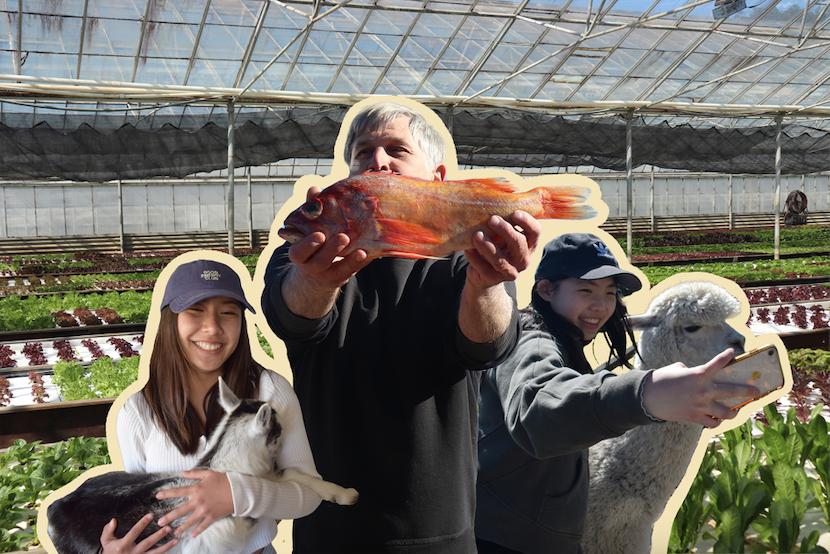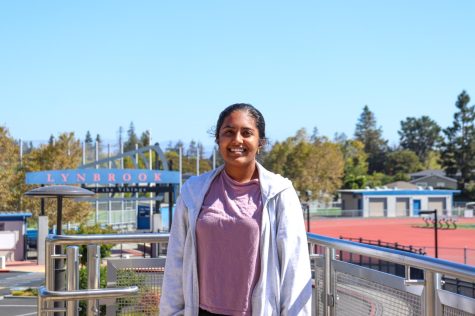Students explore sustainable food on Green Careers field trip
Photos used with permission from Nicholas Kong. Graphic illustration by Nicole Ge and Valerie Shu.
Visiting Half Moon Bay and Pescadero beach, students from cullinary classes across FUHSD, as well as members of the Lynbrook Conservation Action Association club, learn about sustainability in the food and farm industries.
April 10, 2023
Among the crash of waves against piers and the hum of local communities working, students from culinary classes across FUHSD visited Half Moon Bay and Pescadero beach on March 27 to explore the market of sustainable food that dominates California’s coast. In a field trip organized by the Sustainable Future Outdoor Academy, participants learned from business owners and workers about various agricultural careers and sustainable practices.
“As students explore each site and speak with employees and owners, they review the sustainable systems and practices that make each business more efficient and less wasteful,” SFOA’s Marketing Director and on-site coach Lucas Cohen said. “Seeing sustainability in action is one of the best ways to understand the power of sustainable principles.”
Students were selected to attend based on an application process open to all FUHSD culinary classes and members of the Lynbrook Conservation Action Association, where they filled out a form from SFOA detailing why they wanted to explore sustainability. Megan Miller, Lynbrook’s Culinary Arts teacher helped secure funding for the trip.
“Field trips and enrichment activities are designed for being able to present opportunities to students where they didn’t think these things were possible,” Miller said. “We can talk about it in-class, but it’s so much more impactful when students can go out and learn in-person.”
The first stop of the trip was at Pillar Point Harbor, where students learned about how sustainable fishing ties into the seafood industry from the manager of the Old Princeton Landing restaurant. Students then walked to the pier where they learned from a fishery owner about the process of catching and selling fish, commercial fishing regulations and the environmental factors that impact aquatic ecosystems.
“The Silicon Valley area is known for tech — not necessarily food science or sustainability, so I find it inspiring that these kinds of businesses are achievable,” senior and CAA club officer Paulina Chin-Wong said.
The next site was Ouroboros Farm, an aquaponics farm that grows plants in water rather than in soil. Guided by the owner and manager of the farm, students toured the greenhouse, learning the basics of aquaponic farming. As they entered the farm, students viewed koi fish tanks. Students learned about the business behind aquaponics — how it repurposes fish waste, saves water and supports the culture of sustainability in farming.
“I became more aware of the environmental impacts of my actions, especially with food and ways I can reduce that impact,” junior Nicholas Kong said.
Famous for the fish heads stuck on its fence, the locally cherished San Gregorio Department Store hosted the students for lunch. They participated in a blind taste-test, in which students tasted a beef burger patty and a plant-based one, then voted on which they thought was real meat. By comparing these burgers, the students learned how beef production emits an excessive amount of carbon.
The last destination of the trip was Harley Farms, which raises Alpine goats and produces feta and ricotta cheese. The students toured the farm, learning how cheese is made and to reuse water during the milking process. Students had the opportunity to pet and carry baby goats or buy products from the farm’s shop. The farm’s owner, Dee Harley, talked to students about her business endeavors before ending the trip with a cheese tasting.
“I like to show my students non-traditional paths in the culinary world,” Miller said. “I hope this trip helped students open their eyes to the variety of careers out there.”
From fishing piers to goat farms, students visited a wide array of institutions that consistently incorporate sustainable practices into their work. Through learning about food-related careers and industries that practice sustainability, the field trip helped students learn how to implement eco-friendly practices into their daily lives.




























































